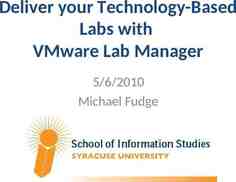The University of New Mexico New Mexico Surety Task Force Panel on
18 Slides2.17 MB

The University of New Mexico New Mexico Surety Task Force Panel on Cyber Security “High Power Electromagnetic Threats to the Civilian Infrastructure - A New Concern for a New Age”

THE UNIVERSITY OF NEW MEXICO “High Power Electromagnetic Threats to the Civilian Infrastructure - A New Concern for a New Age” Professor Edl Schamiloglu Department of Electrical and Computer Engineering University of New Mexico Albuquerque, NM 87131 505/277-4423 [email protected] Director, Institute for Infrastructure Surety http://www.ece.unm.edu/ifis A copy of this presentation can be downloaded from : www.ece.unm.edu/ifis/news.htm 2 November 05, 2004 DEPARTMENT OF ELECTRICAL & COMPUTER ENGINEERING

THE UNIVERSITY OF NEW MEXICO The Problem “The increasing complexity and interconnectedness of energy, telecommunications, transportation, and financial infrastructures pose new challenges for secure, reliable management and operation.1” “Complex interactive networks are omnipresent and critical to economic and social well-being.1” [1] M. Amin, “National Infrastructures as Complex Interactive Networks,” Chapter 14 in Automation, Control, and Complexity: An Integrated Approach, T. Samad and J. Weyrauch, Eds. (John Wiley and Sons, NY, 2000). 3 November 05, 2004 DEPARTMENT OF ELECTRICAL & COMPUTER ENGINEERING

THE UNIVERSITY OF NEW MEXICO The Threat IEEE SPECTRU M Nov. 2003 4 November 05, 2004 DEPARTMENT OF ELECTRICAL & COMPUTER ENGINEERING

THE UNIVERSITY OF NEW MEXICO Terminology HPM is loosely applied to both narrowband and ultra-wideband high power microwave systems. This is DoD usage. In the civilian standards community IEMI (Intentional Electromagnetic Interference) is used synonymously with HPM. 5 November 05, 2004 DEPARTMENT OF ELECTRICAL & COMPUTER ENGINEERING

THE UNIVERSITY OF NEW MEXICO Block-Diagram of a Narrowband HPM System Copyright 2003 N.Y. Times. Reprinted by Permission. November 05, 2004 DEPARTMENT OF ELECTRICAL & COMPUTER ENGINEERING 6

THE UNIVERSITY OF NEW MEXICO Block-Diagram of an UWB HPM System 7 November 05, 2004 DEPARTMENT OF ELECTRICAL & COMPUTER ENGINEERING

THE UNIVERSITY OF NEW MEXICO HPM threats are similar to the nuclear EMP threat, except that protection protocols developed against it are ineffective against HPM. 8 November 05, 2004 DEPARTMENT OF ELECTRICAL & COMPUTER ENGINEERING

THE UNIVERSITY OF NEW MEXICO 9 November 05, 2004 DEPARTMENT OF ELECTRICAL & COMPUTER ENGINEERING

THE UNIVERSITY OF NEW MEXICO 10 November 05, 2004 DEPARTMENT OF ELECTRICAL & COMPUTER ENGINEERING

THE UNIVERSITY OF NEW MEXICO 11 November 05, 2004 DEPARTMENT OF ELECTRICAL & COMPUTER ENGINEERING

THE UNIVERSITY OF NEW MEXICO 12 November 05, 2004 DEPARTMENT OF ELECTRICAL & COMPUTER ENGINEERING

THE UNIVERSITY OF NEW MEXICO Foreign Threats RANETS-E (Russia) 500 MW, X-band Pulse length 10-20 ns 500 Hz Average output power 2.5 – 5 kW Antenna gain 45 – 50 dB 5000 kg Volume 9 x 3 x 2 m2 13 November 05, 2004 DEPARTMENT OF ELECTRICAL & COMPUTER ENGINEERING

THE UNIVERSITY OF NEW MEXICO Countries developing such threats Other activity ongoing in: Russia Ukraine Great Britain Germany France Sweden South Africa Netherlands China Taiwan Israel and others There is a danger of proliferation of these sources. 14 November 05, 2004 DEPARTMENT OF ELECTRICAL & COMPUTER ENGINEERING

THE UNIVERSITY OF NEW MEXICO What facilities in New Mexico are vulnerable to such threats? Civil aviation (the Sunport and all other airports, FAA sites, etc.) Power grid Vehicles in the state (trucking, buses, state police, border, etc.) Banking Water (reservoirs, irrigation, dams, etc.) Communications Internet Essentially any infrastructure that operates using microprocessors, computers, sensors, and controllers! 15 November 05, 2004 DEPARTMENT OF ELECTRICAL & COMPUTER ENGINEERING

THE UNIVERSITY OF NEW MEXICO New Mexico should lead the Nation in dealing with this threat 16 November 05, 2004 DEPARTMENT OF ELECTRICAL & COMPUTER ENGINEERING

THE UNIVERSITY OF NEW MEXICO 17 November 05, 2004 DEPARTMENT OF ELECTRICAL & COMPUTER ENGINEERING

THE UNIVERSITY OF NEW MEXICO Conclusions HPM threats against the civilian infrastructure is yet another scenario that organizations need to be aware of and plan for. Standards for hardening against such threats are only now being drafted, yet may be difficult to implement. Just as Moore’s Law predicts future enhancements of processor speeds, and just as we become increasingly reliant on wireless technologies, we are becoming increasingly vulnerable to HPM threats. Our increasingly “Linked*” technological infrastructure also increases our vulnerability to HPM threats. *Albert-Laszlo Barabasi, Linked (Plume, Penguin Group, New York, NY, 2003). 18 November 05, 2004 DEPARTMENT OF ELECTRICAL & COMPUTER ENGINEERING






